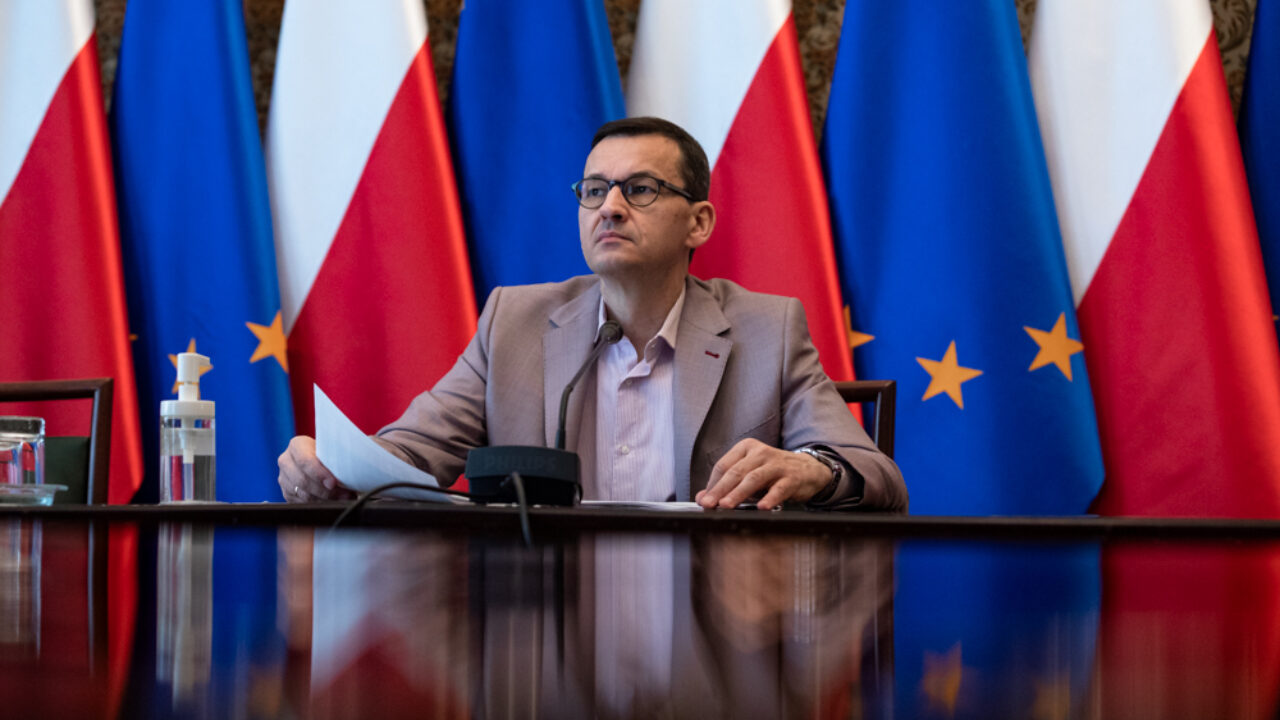Autocratic power grab is no defence of sovereignty
The Polish prime minister has dismissed the dispute between Poland and the EU as a difference of opinion over competences. This is nonsense: the rule of law is at stake
For decades politicians and scholars have warned against the formation of a European super-state. They were concerned that a quiet federalisation of the European Union – whereby technocratic EU institutions such as the European Commission and the Court of Justice of the EU grab more and more power without a treaty change – would hollow out democracy in EU member states and provoke a backlash against the EU. In his recent commentary for NRC Handelsblad, Poland’s prime minister, Mateusz Morawiecki, argues that such an illegitimate overreach by the EU and its disrespect for the Polish constitution are at the heart of the current dispute between Warsaw and Brussels and Luxembourg over the rule of law. He is wrong. The situation in Poland is an example of the opposite scenario to what critics of federalisation by stealth feared. It is the breakdown of democracy in Poland that necessitates an unprecedented reaction by the EU institutions – not the other way around.
The persistence of democracy and the rule of law has been taken for granted for a surprisingly long time in the EU. The question of whether there could be an EU member state that does not have an independent judiciary was seen until recently as at best a theoretical one. This is no longer the case.
No other EU country has gone so far in introducing political control over the courts as Poland ruled by the United Right (the Law and Justice Party). Judges are appointed at the request of an institution most of whose members have been elected only by the votes of the ruling party. Most of these members have political or professional ties to the minister of justice, who is also prosecutor general. The disciplinary system for judges is under his full authority. The minister appoints both disciplinary officials prosecuting judges for alleged misconduct as well as judges of the disciplinary courts who, as part of disciplinary proceedings, issue decisions on penalties for judges, including suspending them from the performance of their duties. Moreover, the minister may intervene in person in each of the disciplinary cases conducted against judges. Judges may be held responsible for the content of their judgments, for the direct application of EU law, and for referring questions to the Court of Justice of the EU for a preliminary ruling. These are not purely theoretical considerations. The current provisions are applied in practice. Judges are under the supervision of politicians and guarantees of their independence have been removed.
No other EU country has gone so far in introducing political control over the courts as Poland
To say that criticism of this system is based on ‘stereotypes and prejudices’, as Morawiecki maintains in his article, is thus nonsense. According to the Court of Justice of the EU, the Polish judiciary violates the treaty obligation to provide effective legal protection by independent courts. Its ruling of 15 July 2021 requires the Polish state to dismantle this. Instead, the politicised constitutional court – upon request by the prime minister – ruled that the corresponding EU treaty provisions are in breach of the Polish constitution. This is a malicious attempt to frame an autocratic power-grab as a defence of the democratic constitution. It has nothing to do with the protection of Poland’s sovereignty and of the rights of Polish citizens. On the contrary: the destruction of the independent courts undermines the Polish rule of law-based order, as well as the foundations of the EU – which made it possible to consolidate and strengthen this order for the first time in the country’s dramatic history. The essence of the Polish problem is not a dispute about the delineation of national and European competences. It is a dispute about whether we think of the EU as a bloc different to a community of democracies.
The rule of law crisis provoked by Morawiecki’s government is thus the most severe challenge to the EU. The EU is a community of law and cannot survive if its application is not adequately ensured. Finding a solution to this fundamental crisis is a precondition for the EU to be able to face up, in unity, to other threats and challenges, whether migration, pandemics, or economic recovery. Such a solution would be very simple: it would take only respect and full implementation of already binding and future decisions of the Court of Justice of the EU. This would be enough to restore the foundations of the rule of law in Poland, prevent the threatened collapse of the EU’s legal order, and defend the authority of the Court of Justice of the EU in this key moment for European integration. This is the minimum for the “loyal EU member state” that Poland wants to be. And this is what all other governments committed to the EU project should insist on.
This article was first published in NRC Handelsblad on 16 November, 2021.
The European Council on Foreign Relations does not take collective positions. ECFR publications only represent the views of their individual authors.



